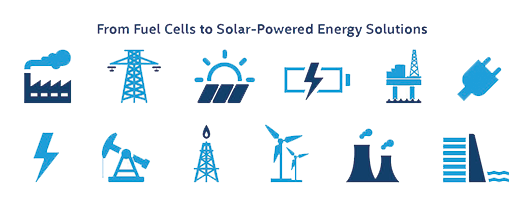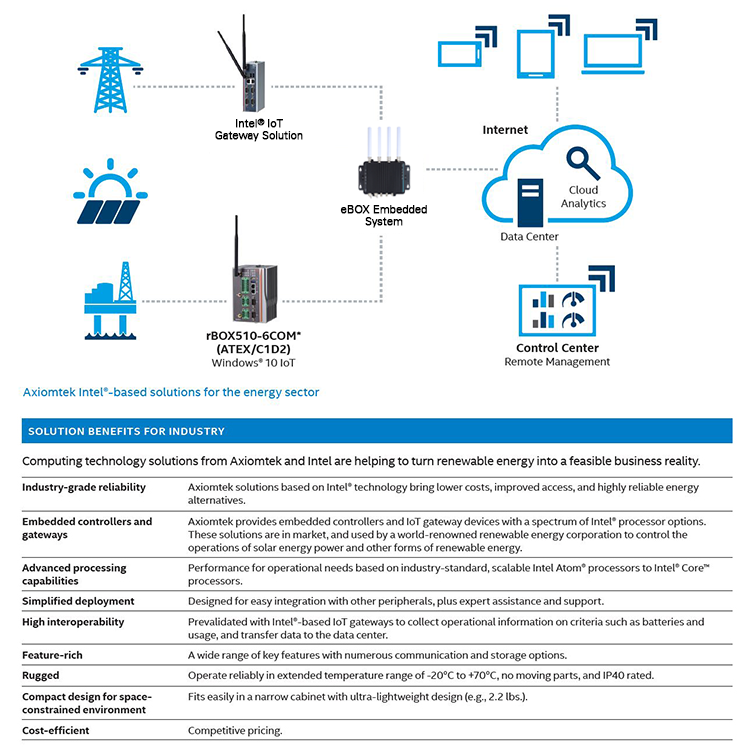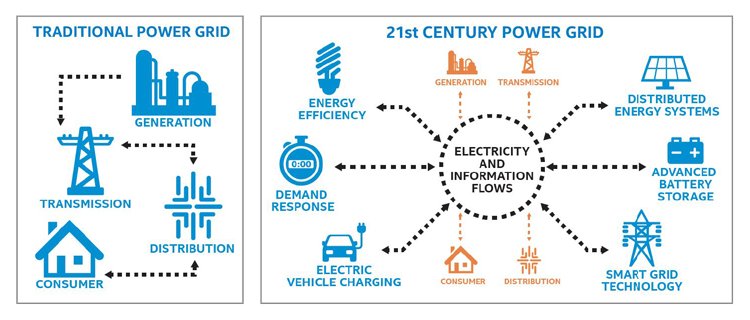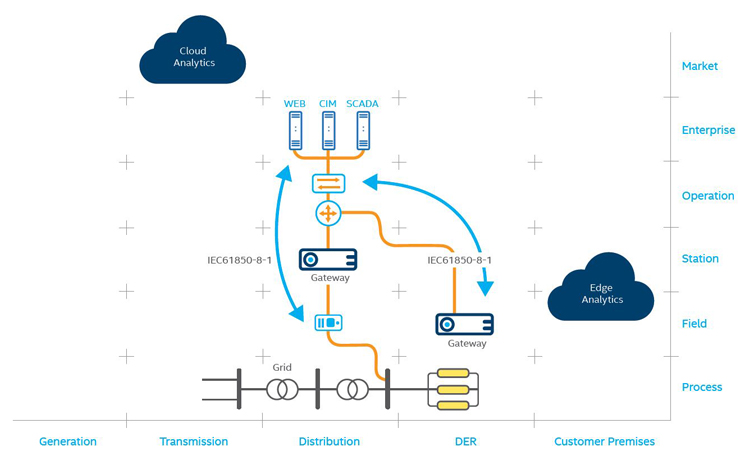Environmental concerns have been changing attitudes toward renewable energy for 30 years. Faced with a scarcity of natural resources, technology innovators have focused on creating new, more convenient methods of obtaining renewable energy — such as wind, hydroelectric, and solar power — for homes and businesses.
Technology is the key factor in successfully converting and managing alternative energy sources. It regulates and delivers the converted power supply for daily use. As technology becomes more advanced, renewable energy becomes cheaper and more efficient. More than ever before, renewable energy is emerging as a highly pragmatic option.
Smart storage and controllers from Axiomtek based on Intel® architecture enable renewable energy solutions, for both businesses and homes, which help improve access, manageability, and analytics for better performance.
Renewable Energy: Access for All
Today’s energy companies face a myriad of challenges—ranging from a strict regulatory environment and unstable fuel market pricing to the cybersecurity risks of increased digitization and the rapid pace of technological change. There is a pressing need to make renewable energy less expensive and more reliable, while ensuring monitoring of delivery and operations. Companies need effective, affordable solutions to utilize solar power and other sources of alternative energy to power machinery, building utilities, and home appliances.
Solar panels — made of a series of small semiconductors — convert direct sunlight particles into electrons and then into electricity. This electricity can be stored or delivered directly for usage and applications, such as electricity for manufacturing facilities, HVAC, lighting fixtures, and charging stations for electric vehicles.

Storage Batteries
Over the years, solar cells have been made with various materials, including different types of silicon, leading to improved efficiency in capturing and converting sunlight. In the 1950s, silicon solar cells had 6 percent efficiency; in recent years, efficiency has increased to more than 44 percent, providing higher sunlight absorption and increased electricity wattage. The development of energy storage batteries gives homes and businesses the ability to use solar energy to power their facilities at any time of the day, not just when the sun is shining.
The U.S. Department of Energy sees storage batteries as key to improving distribution. “Developing technology to store electrical energy, so it can be available to meet demand whenever needed, would represent a major breakthrough in electricity distribution. Helping to try and meet this goal, electricity storage devices can manage the amount of power required to supply customers at times when need is greatest, which is during peak load. These devices can also help make renewable energy, whose power output cannot be controlled by grid operators, smooth and dispatchable.”
Microgrids
A microgrid energy system offers another avenue for providing a consistent infrastructure power supply. It can be designed to power large or small operations, and typically works in conjunction with the main grid. It can also be programmed to work as a stand-alone power source. The energy source for microgrids includes solar, a diesel power generator, wind turbines, and watermills. Different sources of energy can be integrated to work within the microgrid without having to redesign the whole system. Its operations rely on robust hardware and software solutions that have remote and near-real-time management capabilities.
Microgrid system architecture includes distributed energy resources for power generation, storage, and demand management. The system usually requires programmable hardware to support automatic functions, such as usage management, storage, near-real-time control, scheduling, and power load levels. These functions are dependent on aggregated usage analytics.
Energy storage is one of the critical features of a microgrid. It helps stabilize microgrid operations and deliver uninterrupted power supplies. Current technology allows for a range of choices including conventional lithium ion battery cells, flywheels (rotational energy), metal-air batteries, and ice-based thermal storage.
Renewable Energy Technology Requirements for Industry
These batteries, microgrids, and energy conversion processes require computers to control the operations and functions that impact bottom-line performance. Previous controller technology provided limited scalability, low computing power, restricted communications capabilities, and low reliability. These factors, along with inconsistent quality and energy delivery, made renewable energy an expensive and unpopular short-term choice. Today, the controllers selected for conversion need to deliver high levels of reliability. Desirable features include scalable performance, extensive communications capabilities, and rugged designs that can withstand harsh operating conditions.
With the Internet of Things (IoT), hardware solutions have evolved. IoT has helped guide the renewable energy market by offering better ways to manage assets and operations with higher reliability, speed, and greater insight into customer requirements. The need for better, accessible energy alternatives has motivated computer design and manufacture companies to develop solutions that meet essential requirements.
IoT requires a combination of integrated hardware and software; end-to-end solutions that provide easy access to relevant data and safely transfer data through the cloud for further analysis. A variety of communications options for a controller, including 3G, 4G, GPRS, Wi-Fi, Ethernet for LAN, and RS-232, RS-422, and RS-485 ports, are now required by many operations. These solutions are expected to be pretested and prevalidated for compatibility and ease of deployment.
Solutions for Industry
Innovative Intel® technology, in combination with Axiomtek’s advanced embedded computing technology and design, enables controllers to deliver scalable performance, advanced computing capability, remote management, and a wide variety of communications options. These industrial-grade computers meet many required world safety standards important to the energy and power utilities industry, including anti-explosive (ATEX) directives from the European Union (EU). They are often robust, designed to withstand operations in harsh conditions and deliver continued reliability. They are an integral part of a network of connected devices, created to convert and deliver renewable energy from multiple sources, while providing operational insight.
Intel®-based IoT gateway controllers are now pretested and prevalidated with software stacks to ensure enhanced connectivity, security, and manageability. Data can be captured and automatically transferred to data centers for further analysis. This technology allows renewable energy companies to go beyond prior capacity and deliver more efficient and cost-effective renewable energy to their customers.

Case Study in Brief
Technology from Axiomtek and Intel is delivering convenience and cost savings for renewable power, while reducing the greenhouse effect. Storing solar energy can now be achieved with energy storage batteries, which absorb energy at various times during the day and provide electricity for energy consumption in large industrial facilities and homes. Axiomtek’s embedded controllers, like its ICO or rBOX DIN-rail series, can be programmed to prevent overcharging, monitor operational functions, communicate key data and status, and optimize energy use based on usage patterns and setting preferences.
For a world-renowned battery manufacturer, Axiomtek delivered design support, customizability, and standard features that meet a range of energy storage requirements. The product was designed with interoperability in mind and prevalidated with an Intel®-based IoT gateway solution. The resulting system was easy to integrate and deploy with the manufacturer’s legacy technology. Axiomtek’s design assistance engineering team was instrumental in ensuring a fast, efficient process.
The manufacturer enlisted Axiomtek’s design engineering services team to customize its ICO300 IoT gateway controller. Key features on the controller were customized to fit both physical and operational requirements. This DIN-rail, fanless, rugged controller offers wireless, Ethernet, serial, and Wi-Fi communication options. It can operate in wide temperature range of -20°C to +70°C with a heavy-duty aluminum and steel enclosure. This allows for the controllers to be placed in warehouse cabinets or outdoors where temperatures may fluctuate and be extreme. The selected embedded system takes advantage of the Intel® Atom™ processor’s low-power consumption. The processor also delivers the significant processing memory capacity requested by the manufacturer. An alternative choice available is the ICO300-83B, which has scalable CPU options of Intel® Celeron® Processor N3350 or Pentium® Processor N4200 and a wider operating temperature range from -40°C to +70°C.
Because the Axiomtek design supported fast deployment and compatibility with an Intel-based gateway solution, the manufacturer was able to speed time to market.
Sample Use Cases
Axiomtek and Intel solutions support a spectrum of smart energy use cases, including command and control applications, distribution automation, storage and micro-grid controllers, and data-driven smart grid management.
Solar Power Battery Management for Industry, Buildings, and Homes
Power and energy derived from solar panel smart grids can be stored in a battery for later use. This allows for programmable delivery during peak periods when electricity is the most expensive, reducing electrical bills. The smart battery can also be programmed as a backup power source in case of blackouts, and help prevent grid surges to provide a steady stream of current for smooth operations.
Data on solar conversion, energy delivery, storage, and programmed features is valuable and needs to be captured, reported, and transferred for analysis. Near-real-time information is instrumental for analyzing and predicting usage patterns. Prediction allows charging and discharging cycles to be scheduled to ensure sufficient supply of power, especially during peak usage periods.
Optimizing the process and battery performance requires an intelligent gateway controller that can perform all of the above requirements with high levels of reliability and flexibility.
Axiomtek offers multiple versions of the robust, smart controller, including the rugged rBOX. The rBOX product line is designed and manufactured specifically to serve the power utility and renewable energy market. Options based on Intel® Core™ processors and Intel® Celeron® processors, as well as the low-power consumption Intel Atom™ processor, are offered for scalability and cost-efficiency.
Microgrid and Wind Farm
One of Axiomtek’s renewable energy customers selected the eBOX565-500-FL as the controller for power management in a wind farm smart grid. The eBOX565-500-FL offers options for 6th Generation Intel® Core™ i5 or Intel® Celeron® CPUs, DDR4-2133 SO-DIMM, wide operating temperature, and wide range power input. It supports jumbo frame technology for communication and Intel® Active Management Technology (Intel® AMT) for remote management. Primary functions of the controller include dynamically managing power by controlling wind turbine operation, managing storage functions, and supplying the power required by users at scheduled intervals, as well as serving as a backup power source for the main grid during critical times. This customer uses the embedded system’s Intel AMT to remotely control the system and reduce their system’s on-site repair costs.
Axiomtek’s ruggedized fanless embedded system, the eBOX800-511-FL, is another contemporary option for the management of power grid and other energy applications. This IP67 system is perfect for outdoor use and is designed for outdoor environments. Its water-proof design with N-jack antenna openings, M12-lockable I/Os, wide operating temperature range, and wide range power input allows for highly reliable operations in harsh environments. The scalable eBOX800-511-FL offers options for Intel® Core™ i5-7300U or Celeron® 3965U onboard CPUs and supports Axiomtek’s proprietary remote management software called AMS.AXView. It also supports Trusted Platform Module 1.2 for enhanced security. Axiomtek’s comprehensive line of embedded systems offer a variety of selections that can be customized and meet different requirements, no matter how complex.
Smart Grid Management
Renewable energy, such as residential and commercial solar power, plays an increasing role in the demands on distribution grids and the overall complexity of predicting fluctuating power needs. Power storage, consumer power generation, and automated home energy management systems are also impacting distribution and grid management. Utility companies need more visibility and control, but they do not always have access to data on related systems and assets.
Optimization of grids requires increased data-based insight, along with improved manageability across legacy and modern systems. Robust embedded controllers or IoT gateway controllers such as those designed and manufactured by Axiomtek, integrated with software solutions based on the Intel® IoT Platform, help utilities and energy companies gather, filter, and analyze data from the edge to the cloud. This provides essential insight into usage patterns and identifies areas where grid performance can be optimized.
Axiomtek’s embedded computers and IoT gateway devices are designed specifically for harsh operating environments such as smart grid operations. These system, platform, and IoT gateway product lines are built with open architecture for easy integration with legacy systems. Products are comprehensive, versatile, robust, and highly reliable. With options for advanced, scalable Intel® CPUs, the system selected can optimize smart grid manageability, offer communications capabilities, and ease the process of data transfer and storage for analytics.
Increased access to operational and usage data improves data analysis, impacting connected device and sensor power grid management. This, in turn, can lower operating costs. Axiomtek offers pretested, prevalidated gateway devices that help ease smart grid network deployment. And to help mitigate security breaches on connected infrastructure, Intel and its subsidiaries, Wind River and McAfee, offer a range of security products and solutions for devices, gateways, networks, and cloud.
Energy generation: Wind-guide vanes use Intel technology to optimize their position as wind conditions change. An embedded computer from Axiomtek controls the wind turbines’ automatic functions, such as turning them on when the power level in the storage fluctuates or drops too low. These robust controllers range from PLC-based Industrial PCs (Axiomtek’s IPC products) to rugged, anti-explosive, ATEX/C1D2-certified controllers (Axiomtek’s rBOX products). They offer wide operating temperature ranges and are up to IP67-rated for outdoor-ready systems.
Energy distribution: Substation control systems, such as those manufactured by Axiomtek, use Intel’s processing horsepower to monitor and control all sections of an electrical transmission and distribution network.
Monitoring energy use: Home energy management systems provide near-real-time data about energy use and offer energy savings solutions.

Solutions based on the Intel® IoT Platform support active, data-driven grid management
Why Axiomtek
Axiomtek and its industry-leading software, hardware, and technology partners are helping system integrators achieve faster time-to-market. It helps developers and integrators build intelligent, near-real-time, end-to-end solutions. Axiomtek offers design assistance and integration services with COTS-based products to accelerate the process and help increase ROI. Additional value-added services are available, including pre- and post-product launch services.
Reliability: Axiomtek’s products offer high quality, longevity, and reliability.
Comprehensive resources: Axiomtek is in compliance and certified with a variety of international quality and safety standards (e.g., ISO9001). The company’s global footprint offers product and service support to corporations with locations around the world. Expert R&D resources are available and ready to support customers’ projects. Regional local engineering teams are on standby to address technical needs.
Product designed with you in mind:
- The ICO product line was designed for IoT use. The ICO300 is constantly upgraded with the latest Intel® CPU technologies to ensure applicability in the energy market. It provides enterprise-grade security and intelligent manageability, while simplifying the development process for IoT-related applications.
- The eBOX series is comprehensive and versatile, with systems ranging from highly rugged, IP67-rated to standard, high-interoperability, and cost-effective models. Axiomtek’s eBOXes, based on the latest Intel technologies, are feature-rich, scalable and highly customizable. These high-quality, reliable products are easily integrated. They are designed to shorten development and deployment, helping customers realize a fast and strong return on investment.
Near-real-time processing capable: The ICO product line supports integration with a range of leading near-real-time operating systems.
A Smart Foundation for Industrial IoT
Intel-based solutions are reshaping the way we generate, transmit, distribute, and consume energy for the connected era. New energy sources, environmental and regulatory drivers, and new consumer demands mean the electric grid must become a digitized, standards-based, automated, and interoperable infrastructure. Modernizing the electric grid depends on ensuring end-to-end connectivity, reliability, and security from generation and transmission to distribution and consumption.

Solutions based on the Intel® IoT Platform support active, data-driven grid management
Intel, along with McAfee and Wind River, is delivering scalable hardware and software solutions that integrate into existing energy infrastructure to bridge traditional IT and operations — turning data into knowledge and enabling intelligence across the grid to help solve the energy industry’s greatest challenges.
Intel® processors and chipsets provide scalable choices for a range of application, performance, and budget needs. Intel Atom® processors for IoT provide flexible, low-power computing for a wide variety of small form factor applications, bringing low-cost connectivity, integration, and compatibility to the next wave of smart things.
Intel-based IoT gateways, such as the ICO product series offered by Axiomtek, provide preintegrated, prevalidated hardware and software building blocks. The gateways connect legacy and new systems, and enable seamless and more secure data flow between edge devices and the cloud.
Intel® Active Management Technology (Intel® AMT) enables embedded developers to diagnose and repair devices remotely, ultimately lowering IT support costs. Intel® AMT is a feature of Intel® Core™ processors with Intel® vPro™ technology1,2 and workstation platforms based on select Intel® Xeon® processors.
Conclusion
Demand for renewable energy is on the rise. New computer technologies, such as energy storage batteries and smart controllers, have become increasingly more advanced and accessible. Axiomtek designs and manufactures industrial computers and gateway products using highly reliable, scalable, high-performance Intel technologies to support the complex needs of this growing market. Axiomtek and Intel’s overriding goal is to deliver higher levels of efficiency across operations that will result in higher returns on investment.


